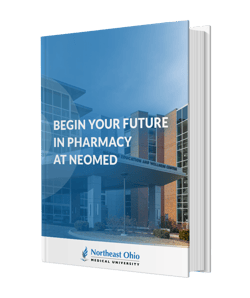What Can You Do with a Pharmacy Degree?
Written by Kelly Tomory
April 21, 2023

Close your eyes and picture a pharmacist. Are you seeing a person in a white coat handling prescriptions at CVS or Walgreens? That’s what most people see when they picture a pharmacist, but it’s a rather limited perspective.
Once they’ve earned the right degree, there’s a whole world of career options for pharmacists. Keep reading to learn more about the typical pharmacist work environment in both clinical and non-clinical pharmacy careers.
What Degree Does a Pharmacist Need?
Students often wonder just what kind of degree it takes to become a pharmacist. With a little bit of research, most students discover there are two kinds of pharmacy degrees: a doctor of pharmacy or Pharm.D., and a doctorate in pharmacy or Ph.D. It may not be immediately clear which degree is the better fit for your career goals, but there’s one major thing to consider when deciding on a pharmacy degree:
If you want to be a practicing pharmacist, whether you want to work in a clinical setting or not, you must have a Pharm.D. to become licensed.
Generally speaking, the Pharm.D. prepares you to become a general pharmacy practitioner and is a qualification for the pharmacist licensure exam, while the Ph.D. prepares you for a career in academia or in research and development.
If you’re unsure which degree is the best fit for you, you should consider what kind of pharmacy career you’d like to pursue. If you want to work as a pharmacist, whether in a government agency, pharmaceutical company, hospital, university or anywhere else, a Pharm.D. is the only degree that can get you there.
Types of Jobs You Can Get with a Pharmacy Degree
With a Pharm.D., careers you can pursue are typically funneled into two tracks: clinical and non-clinical pharmacy careers. Clinical pharmacy careers generally provide direct patient care. Pharmacists working in a clinical setting diagnose, treat and care for patients directly. Non-clinical pharmacy jobs may involve treating patients, but most are directed toward supporting patient care, developing new treatments, and educating future pharmacists. Let's explore more about clinical and non-clinical pharmacy careers below.
Clinical Pharmacy Careers
There are several different clinical pharmacy career paths, from community (that’s your CVS pharmacist) to veterinary pharmacists, and everything in between. Many clinical pharmacy careers require pharmacists to complete one to two years of pharmacy residency. NEOMED offers a postgraduate year one (PGY1) Pharmacy Practice Residency Program which had an 86% match rate in 2023 to pharmacists looking to expand their clinical expertise. Check out some of these potential career paths you might consider on the clinical side:
Community Pharmacist
- Work with members of your local community
- Prepare and dispense medications, counsel patients, provide immunizations and help community members live healthier lives through health-centered programming
Compounding Pharmacist
- Prepare customized prescription medications
- Create customized medications for humans or animals in a laboratory by making different dosage forms, different dose options, and different flavors (if you like cooking/baking, this might be a great option for you!)
Hospital Pharmacist
- Work as part of a high-functioning care team in hospital settings
- Prepare and dispense medications, review patient charts, monitor medication therapy and develop pharmacy procedures to ensure patients receive the right medication and the right time
Veterinary Pharmacist
- Work in hospitals, veterinary schools, zoos, aquariums and more
- Compound, dispense and administer medications for sick and injured animals
Non-Clinical Pharmacy Careers
If you don’t want to help patients directly, that doesn’t mean pharmacy can’t be a great fit for you. In fact, you can still be a successful pharmacist without ever working with a patient either directly or indirectly. Here are some non-clinical pharmacy careers you might consider:
Government Pharmacist
- Work for federal agencies, like the FDA, the U.S. Public Health Service, Veterans Affairs or state and local authorities
- Compound prescriptions, advise on drug therapy and usage, assist with research and development of new medicines and evaluate drug proposals from private industries
Pharmaceutical Companies
- Could work as part of a team in marketing, medical or regulatory affairs or research and development
- Ensure compliance with promotional rules, provide strategic direction for a product or educate physicians and other health care professionals on products, help create new products and conduct and analyze experiments
University Professor
- Work as a professor and faculty member as part of a university department
- Combines teaching, research and clinical practice
These are just some of the many career paths open to pharmacists. Pharmacy graduates are qualified to do so much more than work in drug stores. Whether you hope to work in the pharmaceutical industry, government agency or industry, a doctor of pharmacy degree can help you get there.
Get Your Pharmacy Degree at NEOMED
If you want a rewarding and lucrative career that will allow you to advance community health, a career in pharmacy can make your dreams a reality. At NEOMED, we’re graduating a new breed of pharmacists who are focused on patient care, community health and helping people live better, healthier lives.
Our latest resource is designed to provide you with all you need to know about pharmacy degree programs, applying to pharmacy school and more, so you can take the next step toward your future as a pharmacist.

Access our eBook
"Begin Your Future in Pharmacy at NEOMED" to learn what the College of Pharmacy has to offer you.
About the author
Kelly Tomory
Assistant Director of Admission

